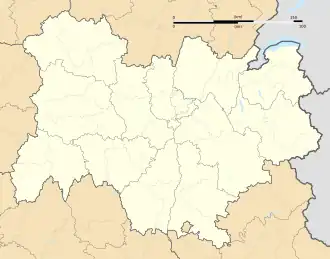Balbigny
Balbigny | |
|---|---|
Commune | |
Town hall | |
Location of Balbigny | |
 Balbigny  Balbigny | |
| Coordinates: 45°49′09″N 4°11′17″E / 45.8192°N 4.1881°E | |
| Country | France |
| Region | Auvergne-Rhône-Alpes |
| Department | Loire |
| Arrondissement | Roanne |
| Canton | Le Coteau |
| Government | |
| • Mayor (2020–2026) | Gilles Dupin[1] |
Area 1 | 16.98 km2 (6.56 sq mi) |
| Population (2022)[2] | 2,848 |
| • Density | 170/km2 (430/sq mi) |
| Time zone | UTC+01:00 (CET) |
| • Summer (DST) | UTC+02:00 (CEST) |
| INSEE/Postal code | 42011 /42510 |
| Elevation | 314–482 m (1,030–1,581 ft) |
| 1 French Land Register data, which excludes lakes, ponds, glaciers > 1 km2 (0.386 sq mi or 247 acres) and river estuaries. | |
Balbigny (French pronunciation: [balbiɲi]) is a commune in the Loire department in central France.
History
Balbigny owes its name to a Roman general named Balbinius who based himself here in order to conduct a war. Nothing survives from this period. The earliest identified traces of Balbigny date from 1090.
During the eighteenth and nineteenth centuries, before the Loire was channelled, Balbigny was a village of boatmen, known for flat bottomed boats known as Rambertes which were used to transport the coal mined at Saint-Étienne. The loaded Rambertes arrived from Saint-Rambert and stopped off at Balbigny where the boat crews were changed, taking the boats to the next change-over point at Roanne. All this changed in August 1832 with the arrival of the third oldest railway line in France which connected Andrézieux-Bouthéon with Roanne, passing Balbigny en route. An extension of the rail network in 1913 saw Balbigny connected with Saint-Germain-Laval and Régny. The coal was therefore transported by rail, but the railway also gave farmers in the district access to a wider range of markets for their produce.
The road bridge crossing the Loire was destroyed in 1940 in order to hold back advancing German troops, and a ferry service was introduced to permit the river to be crossed. The bridge was rebuilt in 1950.
Population
| Year | Pop. | ±% p.a. |
|---|---|---|
| 1968 | 2,023 | — |
| 1975 | 2,314 | +1.94% |
| 1982 | 2,469 | +0.93% |
| 1990 | 2,415 | −0.28% |
| 1999 | 2,616 | +0.89% |
| 2007 | 2,634 | +0.09% |
| 2012 | 2,897 | +1.92% |
| 2017 | 2,965 | +0.47% |
| Source: INSEE[3] | ||
Twin towns
Balbigny is twinned with:
 Chaumont, Haute-Marne, France
Chaumont, Haute-Marne, France
See also
References
- ^ "Répertoire national des élus: les maires". data.gouv.fr, Plateforme ouverte des données publiques françaises (in French). 2 December 2020.
- ^ "Populations de référence 2022" (in French). The National Institute of Statistics and Economic Studies. 19 December 2024.
- ^ Population en historique depuis 1968, INSEE